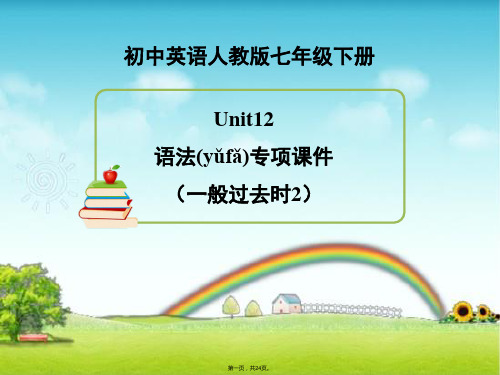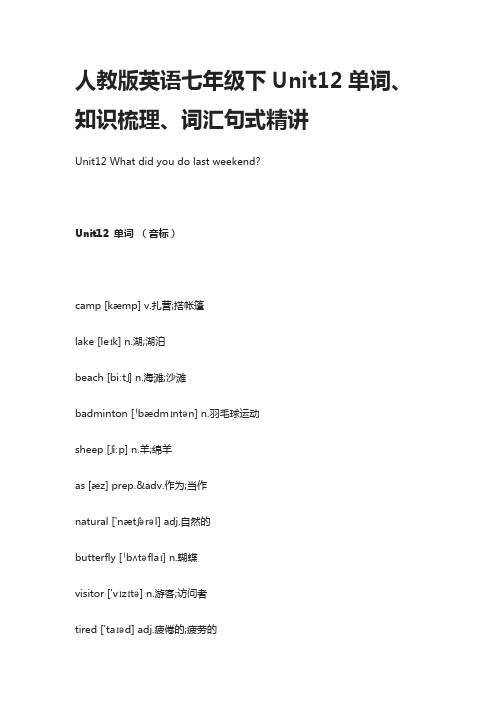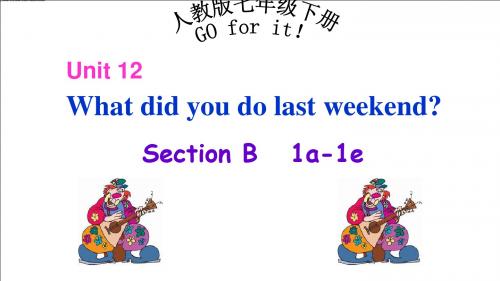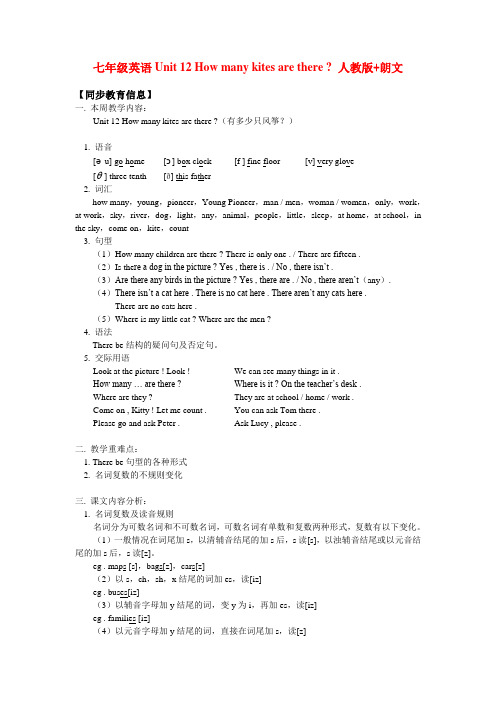人教版七年级英语下册课件:Unit 12 单元语法精讲精练
Unit+12+讲义 人教版七年级英语下册

Unit 12 What did you do last weekend?1.---Who visited her grandmother?---Becky did.答语中did代替句中visited her grandmother.(英语中为了避免重复,经常用does、do、did等来代替前面的动词或相关内容,且时态与问句保持一致)Eg:---Who cooks dinner for you every day?---My father does.(代替cooks dinner)---Do you like watching TV?---Yes,I do.(代替like watching TV)2.I worked as a guide at the Natural History Museum.as:(prep)当作;作为(其后常接表示职业、用途等的名词) 若放在句首,则常用逗号与语句的主体隔开Eg:She works as a giude in a company.As a player, you should do more exercise.辨析:as&likeas: 用于说明同一关系,即两者实为一体like:用于说明相似关系,并不等同Eg:He works as a teacher.(言外之意:He is a teacher.)He works like a teacher.(言外之意:He isn’t a teacher.)3.I stayed up late to watch the soccer game.stay up:熬夜stay up late:睡得很晚与stay相关的常见短语:stay at home待在家里stay away from远离stay healthy保持健康stay out 待在外面与up相关的短语call up 打电话catch up with 赶上come up with提出get up 起床give up放弃grow up 成长look up 向上看;查出make up编造;构成pick up 捡起;中途载人put up 举起;张贴set up 创建show up出现take up 占据turn up调大use up用完;耗尽4.Father mouse shouted at the cat, “Woof,woof.”辨析:shout at &shout toShout at:冲...大声叫喊(多指因生气/愤怒冲某人叫喊)Eg: He loses his temper and shouts at me.shout to:对...大声叫喊(无恶意,多因距离远)Eg: : “Can you hear me?”he shouts to Tom.5.“Well,son,that’s why it’s important to learn a second language.”(1)that’s why...这就是...的原因why引导的名词性从句在句中作表语Eg:That’s why I can pass the important exam,because I study hard. that’s because...那是因为...(表示原因)Eg:He didn’t go to school trip. That’s because he was badly ill.6.flew a kite 放风筝flew为fly的过去式fly的用法:(vi)(1)fly to乘/坐飞机=go (to)...by plane/airEg:She will fly to New York. She will go to New York by plane/air.(2)飞Eg:He hopes he can fly like a bird.(3)飞逝Eg:How time flies! (时光飞逝)(4)苍蝇Eg:Look! A fly is swimming in the porridge.7.There we put up our tents and made a fire to keep us warm and cook food on.(1)put up:搭建;张贴(动副结构)(2)keep的用法Keep sb./sth.+adj 让某人/某物保持...(强调某种状态)Eg:The coat will keep you warm.The students should keep the classroom clean.Keep sb./sth.+doing 让某人/某物一直...(强调动作的持续性)Eg:I’m sorry I’ve kept you waiting.8.The next morning,my sister and I got a terrible surprise.get a surprise 吃惊(可数名词)surprise:(不可数名词)in surprise惊奇地;惊讶地To one’s surprise 令某人惊讶的是(vt)使吃惊;使惊奇(adj)surprising surprisedEg:Her idea surprises me.9.I was so scared that I couldn’t move.(1)so...that...如此...以致于... (so后接adj/adv)Eg:The box is so heavy that I can’t carry it.He runs so fast that I can’t catch up with him.拓展:such+a/an+adj+单数可数名词+that...相当于so+adj+a/an +单数可数名词+that...Eg:Mr. Yi is such a kind teacher that we all like him. Mr. Yi is so kind a teacher that we all like him.(2)scared:惊慌的;吓坏了的=afraidbe scared of sth. 害怕做某事be scared to do sth.害怕做某事Eg:Miss Zhang is scared/afraid of the ghost.The little boy is scared/afraid to read in fornt of the others.10.感叹句(what/how )。
新人教版英语七年级下册Unit12-语法专项课件(一般过去时2)

No often。2.just now 刚刚。如果谓语之前有did,谓语动词需还原。动词若是was,were,否定
就把not添。-Yes, she was.。-Yes, she did.。go
Image
第二十四页,共24页。
第七页,共24页。
考点大观 易错辨析 通关训练
易错点1 一般过去(guòqù)时陈述句变为特殊疑问句
What did you do the day before yesterday? 前天你们做什么(shén me)了? When did the Green Family arrive? 格林一家什么(shén me)时候到达的?
find—found bring —brought spend—spent teach—taught
第十七页,共24页。
易错点4
实义动词(dòngcí) 需还原
考点大观 易错辨析 通关训练
助动词是照妖镜,后边(hòu bian)动词现原形。
第十八页,共24页。
易错点4
实义动词(dòngcí)需 还原
第九页,共24页。
考点大观 易错辨析 通关训练
易错点1 一般过去(guòqù)时陈述句变为特殊疑问
句
第二步 语序(yǔxù)变化
1) 对主语提问(tíwèn)语序不变 Your friend came to send an email.
Who came to send an email?
第十页,共24页。
考点大观
一般(yībān)过去时标 志词
易错辨析
通关训练
时间状语 1. yesterday 昨天
时间状语 6. this morning 今天早上
2.just now 刚刚 a moment ago刚才
人教版英语七年级下Unit12单词、知识梳理、词汇句式精讲

人教版英语七年级下Unit12单词、知识梳理、词汇句式精讲Unit12 What did you do last weekend?Unit12 单词(音标)camp [kæmp] v.扎营;搭帐篷lake [leɪk] n.湖;湖泊beach [biːtʃ] n.海滩;沙滩badminton [ˈbædmɪntən] n.羽毛球运动sheep [ʃiːp] n.羊;绵羊as [æz] prep.&adv.作为;当作natural ['nætʃərəl] adj.自然的butterfly [ˈbʌtəflaɪ] n.蝴蝶visitor ['vɪzɪtə] n.游客;访问者tired ['taɪəd] adj.疲倦的;疲劳的stay [steɪ] v.停留;待stay up late 深夜不留睡;熬夜away [ə'weɪ] adv.离开;远离run away ['rʌnəˌweɪ] 跑开mouse (pl. mice) 老鼠;耗子baby ['beɪbi] adj.&n.幼小的;婴儿shout [ʃaʊt] v.呼叫;喊叫shout at…冲……大声叫嚷woof int.(狗叫声)汪汪language ['læŋgwɪdʒ] n.语言fly (flew) v.飞kite [kaɪt] n.风筝fiy a kite 放风筝high [haɪ] adj.&adv.高的(地) high school 中学ago [ə'gəʊ] adv.以前India ['ɪndɪə] n.印度tent [tent] n.帐篷put up ['pʊtʌp] 搭起;举起moon [muːn] n.月亮surprise [sə'praɪz] n.&v.惊奇;惊讶;使吃惊get a surprise 吃惊snake [sneɪk] n.蛇scared [ /skeəd] adj.惊慌的;吓坏了的move [muːv] v.移动shout to…对……大声喊叫start [stɑːt] v.开始;着手jump [dʒʌmp] v.跳;跃up and down 上上下下;起伏wake (woke) v.弄醒;醒wake…up 把……弄醒into ['ɪntuː] prep.到……里面;进入forest [ˈfɒrɪst] n.森林ear [ɪə] n.耳朵Unit12 知识梳理【重点短语】1. last weekend 上周末2. do one’s homework 做作业3. go to the cinema 看电影4. go boating 去划船5. camp by the lake 在湖边露营6. go to the beach 去海滩7. play badminton 打羽毛球8. on Saturday morning 在周六的早上9. study for the English test 为了英语考试学习10. feed some cows 喂一些奶牛11. work as a guide 做为一个导游工作12. Natural History Museum 自然历史博物馆13. butterfly house 蝴蝶馆14. over 200 kinds ofbutterflies 超过200多种蝴蝶15. tell sb about …告诉某人关于…16. living habits 生活习惯17. be kind of tired 有点儿累19. stay up 熬夜20. play with sb. 和某人玩21. lose things 丢东西22. run away 跑开23. fly a kite 放风筝24.as a special gift 作为一个特殊的礼物25. take sb. to sp. 把某人带到某地26. go camping 去露营27. put up the tents 搭建帐篷28. make a fire 生火29. keep sb. warm 使某人保持温暖30. on the first night 在第一天晚上31.so...that... 如此…以至于…32. go to sleep 去睡觉33. get a surprise 吃惊34. see sb. doing sth. 看见某人正在做某事35. jump up and down 上蹦下跳36. climb onto one’s back 爬到某人背上37. shout at/shout to 大声喊叫38 wake …up 把...弄醒39. move into…移入,爬进…中40. a useful lesson 有用的一课【重点句型】1.---What did you do last weekend?你上周末做了什么?---Well, on Saturday, I played badminton.噢.周六我打羽毛球了。
人教版七年级英语下册Unit 12 What did you do last weekend Section B 1a-1e教学课件共36张PPT含听力

Come here! I have something important to
tell you. 过来!我有一些重要的事要告诉你。
Practise
改错。
Sally wants to do different something
this time.
something different
Exercise
Jim: Well, Is_a_n_g_ and _p_la_y_e_dthe guitar on Saturday morning. On Sunday afternoon, I_f_le_w__a_k_i_t_e_i_n_t_h_e_p__a_rk__. And on Sunday night, I _h_a_d__d_in_n_e_r_ with my friends.
Lily/watch TV last night
–What did she do last night? –she watched TV at home.
On Saturday
IIsIrwewaedmntninetowa tshpweailmpibemrasinr.yg. pool.
on Sunday
Uncle Bob/go fishing
last weekend
–What did Uncle Bob do last weekend? –He went fishing.
they /climb mountains
last year
–What did they do last year?
–They climbed mountains.
Unit 12
What did you do last weekend?
人教版初中英语七年级下册11--12单元讲义重点短语语法归纳配练习答案

人教版初中英语七年级下册十一单元讲义教案UNIT11第一部分【重点短语】给奶牛挤奶去钓鱼骑马喂鸡go for a walk show sb. aroundquite a lot/quite a lot of+n.learn a lot about sth. grow strawberriespick strawberries pick uptake sth. home in the countrysideworry+that从句worry about ……/be worried about ……last week come outIt was so much fun. have so much fun.an art museum the science museumgo on a trip along the waymake a model robot buy sth. for sb.= buy sb. sth.all in all it’s difficult (for sb.) to do sth.not at all be interested in (doing)sth.【答案】从左至右:milk a cow; go fishing; ride a horse; feed chickens; 去散步=take a walk;带领某人参观;相当多的;关于…学到很多;种草莓;摘草莓;捡起/接某人;带…回家; 在农村;担心……; 担心某人某事;上周;出来/出版/开花;如此有趣;玩得非常开心;一个艺术博物馆;科学博物馆;去旅行;沿途;制作一个机器人模型;为某人买某物;总之;对某人来说做某事很困难;根本不/一点也不;对(做)…感兴趣第二部分【重点语法】一、一般过去时1.定义一般过去时表示过去某个时间或一段时间内发生的动作或状态;也可表示过去经常或反复发生的动作。
e.g.I got up at 7:00 yesterday. 我昨天7点起床。
人教版七年级英语下册 Unit 12 SectionB 知识点串讲课件(共48张ppt)

Language points
1. ride ride此处作可数名词,意为“(乘车的)旅行, 旅程”。 take a ride 兜风 ride 还可作动词,意为“骑(马等);乘(车)等”。 例句:你妹妹会骑自行车吗? Can your sister ride a bike?
2. put up 搭起 put up 还可意为“举起;张贴;建造”。 put的过去式是它本身。 例句:你能帮我贴广告吗? Can you help me put up some ads?
Camping
2a
What kinds of animals are people sometimes afraid of? Why? Make a list.
mouse
spider
snake
lion
tiger
wolf
Reading
A Weekend to Remember
Task 1 Fast Reading
guitar
Alice
had dinner with
friends
Cindy
went to the library
Linda
studied for a test
Jane
swam in a swimming
pool
Who…?
… did.
Language points
1. Did you do anything interesting last weekend? 该句是一般过去时的疑问句。 句型结构:Did+主语+动词原形+其他? 例句:你昨天早上做家庭作业了吗? Did you do your homework yesterday morning?
七年级英语Unit 12 How many kites are there 人教版+朗文知识精讲

七年级英语Unit 12 How many kites are there ?人教版+朗文【同步教育信息】一. 本周教学内容:Unit 12 How many kites are there ?(有多少只风筝?)1. 语音[əu] go home [ɔ] box clock [f ] fine floor [v] very glove[ ] three tenth [ð] this father2. 词汇how many,young,pioneer,Young Pioneer,man / men,woman / women,only,work,at work,sky,river,dog,light,any,animal,people,little,sleep,at home,at school,in the sky,come on,kite,count3. 句型(1)How many children are there ? There is only one . / There are fifteen .(2)Is the re a dog in the picture ? Yes , there is . / No , there isn’t .(3)Are there any birds in the picture ? Yes , there are . / No , there aren’t(any).(4)There isn’t a cat here . There is no cat here . There aren’t any cats here .There are no cats here .(5)Where is my little cat ? Where are the men ?4. 语法There be结构的疑问句及否定句。
5. 交际用语Look at the picture ! Look ! We can see many things in it .How many … are there ?Where is it ? On the teacher’s desk .Where are they ? They are at school / home / work .Come on , Kitty ! Let me count . You can ask Tom there .Please go and ask Peter . Ask Lucy , please .二. 教学重难点:1. There be句型的各种形式2. 名词复数的不规则变化三. 课文内容分析:1. 名词复数及读音规则名词分为可数名词和不可数名词,可数名词有单数和复数两种形式,复数有以下变化。
人教版七年级下册英语Unit12单元语法知识点总结

人教版七年级下册英语Unit12单元语法知识点总结本单元重点短语的具体用法1. Last weekend:用于描述过去的时间,通常在句子中作时间状语。
例如:I went shopping last weekend.(我上周末去购物了。
)2. Do one's homework:表示做作业。
例如:I need to do my homework before going out.(我需要在出去之前做作业。
)3. Go to the cinema:去看电影。
例如:They decided to go to the cinema instead of staying at home.(他们决定去电影院而不是待在家里。
)4. Go boating:去划船。
例如:We went boating on the lake and had a great time.(我们在湖上划船,玩得很开心。
)5. Camp by the lake:在湖边露营。
例如:They camped by the lake and enjoyed the beautiful scenery.(他们在湖边露营,欣赏美丽的风景。
)6. Go to the beach:去海滩。
例如:I like to go to the beach to relax.(我喜欢去海滩放松。
)7. Play badminton:打羽毛球。
例如:They played badminton in the park.(他们在公园里打羽毛球。
)8. On Saturday morning:在周六的早上。
例如:On Saturday morning, I usually sleep in.(在周六的早上,我通常会睡懒觉。
)9. Study for the English test:为英语考试学习。
例如:I have to study for the English test tomorrow.(我必须为明天的英语考试学习。
